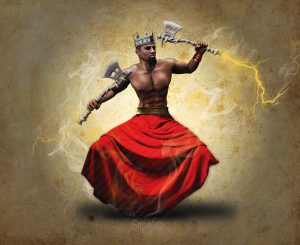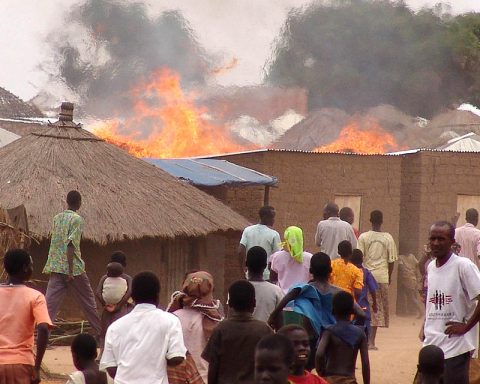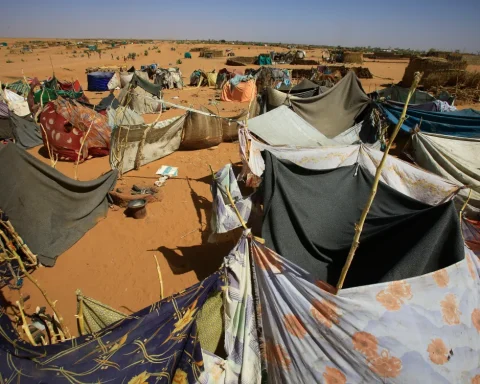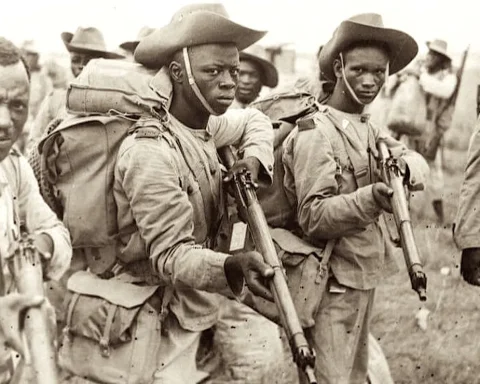It is easy to throw up a button, and it will fall on some random article or movie made about Zeus or Thor. One could find more chimes in the black community about Wakanda, which has little to nothing to do with African tradition or culture in a real sense than one would find African-Americans with basic knowledge about the pantheon of colorful and interesting Gods and folklore characters found in African mythology.
Here is a list of sub-saharan African thunder deities that has just as many compelling mythologies, histories, and folklores surrounding them as any other Thunder Gods you can find.
- Amadioha:

The South-Eastern part of Nigeria is a tribe called the Igbo people. Amadioha in Igbo tradition is the Alusi (god) of Thunder and lightning, Skies, justice, peace, love, judgment, masculine fertility, and husband of the earth goddess (ala).
Amadioha is a deity marked by his popularity and consideration for the collective will of the people, which earned him the name Amadioha, meaning, the man of the people.
other names are Kamalu, Kalu akanu or ofufe.
He is represented in an eclectic youthful persona. His sacred symbol and animal is the ram; according to legend, he is as determined, unfearful and stubborn as the ram.
His color is red and Afo, the third day in Igbo four days calendar week is his sacred day.
When next you hear a persistent thunderstorm, it may just be Amadioha showboating.
- Shango:

At the South-Western part of Nigeria is the Yoruba tribe. Shango, unlike his other counterparts, didn’t start as a God, he was once a human. Before becoming an Orisha (god) Sango was once the third Alaafin of Oyo – a very powerful royal office in Yoruba tradition.
He is famously known for his anger, which played an integral role in his deification. In a fit of rage against his wives, Shango destroyed his palace and everyone in it with thunder and lightning, tragically ending his reign, bringing his household to ruin.
He is often feared since his hot-headedness transcended his humanity into Godhood. He is often represented with an ax in hand.
- Kiwanuka:Kiwanuka is the (Lubaale) god of thunder and lightning of the Baganda. Inside the popular mythology, this deity is a completely harsh and fierce warrior god who lives inside the sky. He maintains social order and is the custodian of the law in the sky on behalf of his father Ggulu the lord of heaven.
His visits on the planet are announced by thunder and lightning. He makes use of a hammer as his principal weapon. He is also depicted to carry a spear sometimes. However, the hammer is his foremost weapon. Every time lightning strikes, it is believed that Kiwanuka has used his hammer to cause harm to the objects struck by way of the lightning. Kiwanuka’s hammer resembled a mallet; the wood contraptions used to make bark cloths; however, it is manufactured from metal.
It is easy to throw up a button, and it will fall on some random article or movie made about Zeus or Thor. One could find more chimes in the black community about Wakanda, which has little to nothing to do with African tradition or culture in a real sense than one would find African-Americans with basic knowledge about the pantheon of colorful and interesting Gods and folklore characters found in African mythology.
Here is a list of sub-saharan African thunder deities that has just as many compelling mythologies, histories, and folklores surrounding them as any other Thunder Gods you can find.
- Amadioha:
The South-Eastern part of Nigeria is a tribe called the Igbo people. Amadioha in Igbo tradition is the Alusi (god) of Thunder and lightning, Skies, justice, peace, love, judgment, masculine fertility, and husband of the earth goddess (ala).
Amadioha is a deity marked by his popularity and consideration for the collective will of the people, which earned him the name Amadioha, meaning, the man of the people.
other names are Kamalu, Kalu akanu or ofufe.
He is represented in an eclectic youthful persona. His sacred symbol and animal is the ram; according to legend, he is as determined, unfearful and stubborn as the ram.
His color is red and Afo, the third day in Igbo four days calendar week is his sacred day.
When next you hear a persistent thunderstorm, it may just be Amadioha showboating.
- Shango:
At the South-Western part of Nigeria is the Yoruba tribe. Shango, unlike his other counterparts, didn’t start as a God, he was once a human. Before becoming an Orisha (god) Sango was once the third Alaafin of Oyo – a very powerful royal office in Yoruba tradition.
He is famously known for his anger, which played an integral role in his deification. In a fit of rage against his wives, Shango destroyed his palace and everyone in it with thunder and lightning, tragically ending his reign, bringing his household to ruin.
He is often feared since his hot-headedness transcended his humanity into Godhood. He is often represented with an ax in hand.
- Kiwanuka:Kiwanuka is the (Lubaale) god of thunder and lightning of the Baganda. Inside the popular mythology, this deity is a completely harsh and fierce warrior god who lives inside the sky. He maintains social order and is the custodian of the law in the sky on behalf of his father Ggulu the lord of heaven.
His visits on the planet are announced by thunder and lightning. He makes use of a hammer as his principal weapon. He is also depicted to carry a spear sometimes. However, the hammer is his foremost weapon. Every time lightning strikes, it is believed that Kiwanuka has used his hammer to cause harm to the objects struck by way of the lightning. Kiwanuka’s hammer resembled a mallet; the wood contraptions used to make bark cloths; however, it is manufactured from metal.





